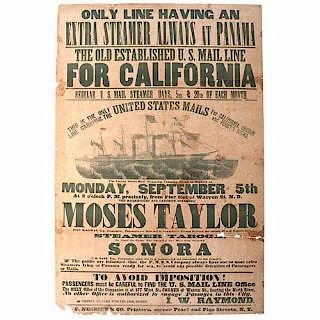Henry Northey Hooper, Important Boston Merchant, Family Archive, Ca 1833-1911
About Seller
6270 Este Ave.
Cincinnati , OH 45232
United States
With offices in Cincinnati, Cleveland and Denver, Cowan’s holds over 40 auctions each year, with annual sales exceeding $16M. We reach buyers around the globe, and take pride in our reputation for integrity, customer service and great results. A full-service house, Cowan’s Auctions specializes in Am...Read more
Two ways to bid:
- Leave a max absentee bid and the platform will bid on your behalf up to your maximum bid during the live auction.
- Bid live during the auction and your bids will be submitted real-time to the auctioneer.
Bid Increments
| Price | Bid Increment |
|---|---|
| $0 | $25 |
| $500 | $50 |
| $1,000 | $100 |
| $2,000 | $250 |
| $5,000 | $500 |
| $10,000 | $1,000 |
| $20,000 | $2,500 |
| $50,000 | $5,000 |
| $100,000 | $10,000 |
About Auction
Jun 10, 2016 - Jun 11, 2016
Cowan's Auctions dawnie@cowans.com
- Lot Description
Henry Northey Hooper, Important Boston Merchant, Family Archive, Ca 1833-1911
Lot of approx. 50 items including family letters, papers, and photographs. Ca 1833-1911.
Descending from a line of Northey silver smiths and ship builders, Henry Northey Hooper (1799-1865) honored his family heritage with his craftsmanship in all of his trades. He was born in 1799 in Manchester, MA to Captain William and Sally Northey Hooper. He first entered the business world by producing nautical equipment until 1825. He apprenticed under the patriot Paul Revere, purchased his Boston foundry, and established Henry N. Hooper & Co. He began manufacturing lamps, lighting fixtures, and bells. Metal, particularly bronze, copper, and silver, became important materials in his career and were often a topic of conversation in many of his letters along with discussions about international and domestic politics. Hooper wrote to Isaac Harris, Jr., in Batavia, Java (Dutch East Indies):
...at the present time while the said powers [Belgium, England, and France] are disputing about sights the Yankees occasionally have the pleasure of picking in a friendly way the cargo of some overgrown Dutch E. Indian who though fear of finding a worse customer just drop into some of our ports (no intrusion) to ask how affairs are at home, and generally think it is best not to go there just yet—Should the affairs of Minnheer [myhneer] look as squally much longer I think that the same merchant ships would be found loading with the brown berry of Java in spite of colonial government monopolies…(Boston, June 10, 1883).
Hooper created fine decorative lighting fixtures, including chandeliers, girandoles, Argand lamps, and other cast and gilt bronze lighting. Congress commissioned him to produce a massive chandelier for the Hall of the House of Representatives. The lighted 13-foot diameter, whale-oil burning fixture, weighing 7,500 lbs., featured over 10,000 cut glass pieces and 78 burners, with all its visible metal parts finished in gold. Witnesses described it as “exceedingly beautiful and extremely brilliant” and “without exception, the largest, most elegant, and splendid chandelier we ever beheld” (Hazard, “Hazard’s United States Commercial and Statistical Register” Vol. III, 1841). His chandeliers and light fixtures are on display at the library of the Longfellow House, Washington's Headquarters National Historic Site, and in the collections of the Metropolitan Museum of Art.
His craftsmanship and commissions in Washington allowed him to mingle with important politicians and dignitaries, including the President Franklin Pierce. John T. Heardy, a friend of Hooper, wrote a letter of introduction to the President. This will be presented by Henry N. Hopper Esq. who is one of our most respected citizens and extensive merchants, and the business establishment which he represents is distinguished for its high standing and responsibility, wrote Heardy (Boston, April 20, 1854). Hooper’s connections in Washington helped him obtain a commission to produce artillery for the Union Army in 1862. His company earned a contract to produce the Napoleon, a 6 ft., 1200 lb. bronze field gun, for the Union Army. Hooper's firm was one of 5 contracted and became the second leading supplier behind the Revere Copper Company. Hooper’s company supplied approximately one-third of the Napoleons made. Today, over 100 Hooper guns survive. Some are on display at Gettysburg, Arlington National Cemetery, and in the Rhode Island State House.
A quarter plate daguerreotype of Hooper taken in New York in January 1843 (as per penciled note in case); 16 of his letters; his daily journal from 1858; other family member’s papers, including 14 of his wife Priscilla's letters to several of their nine children; 3 papers concerning his brother, William B. Hooper ca 1830s-1860s; 8 family photographs, including cabinet card and enlarged photographs of Priscilla and sixth plate daguerreotype of Hooper's daughter, Grace, at age 16; and a volume of The Bradford History, 1898, are included in the lot.
See also Lots 120 and 121 for Civil War-era correspondence involving Henry Northey Hooper's children, Major Isaac Harris Hooper and Lieutenant Colonel Henry Northey Hooper, Jr.
Provenance: Descended Directly in the Family of Henry Northey Hooper, Jr.Most letters are in very good condition with some fading of the ink.Condition
- Shipping Info
-
SHIPPING. At the request of the buyer, Cowan's will authorize the shipment of purchased items. Shipments usually occur within two weeks after payment has been received. Shipment is generally made via UPS Ground service. Unless buyer gives special instructions, the shipping method shall be at the sole discretion of Cowan's Auctions, Inc.. Cowan's is in no way responsible for the acts or omissions of independent handlers, packers or shippers of purchased items or for any loss, damage or delay from the packing or shipping of any property.
-
- Buyer's Premium



 EUR
EUR CAD
CAD AUD
AUD GBP
GBP MXN
MXN HKD
HKD CNY
CNY MYR
MYR SEK
SEK SGD
SGD CHF
CHF THB
THB
















